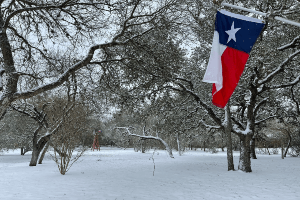 Winter storms caused numerous car accidents in Texas, including a 100-car pileup on Interstate 35. These crashes can be incredibly dangerous and raise the risk for those involved to suffer severe injuries.
Winter storms caused numerous car accidents in Texas, including a 100-car pileup on Interstate 35. These crashes can be incredibly dangerous and raise the risk for those involved to suffer severe injuries.
Victims of these crashes may be eligible to seek compensation for damages. However, determining liability for these crashes may be difficult.
Call one of our car accident lawyers in Fort Worth to discuss the circumstances of your crash to learn how we may be able to help you pursue the compensation you need for medical bills, lost wages, property damage and more.
Winter Weather Effects on Visibility
During heavy snowfall, it may be more difficult for drivers to see the road, and surrounding vehicles, clearly. A driver’s visibility could be reduced to as little as a quarter-mile around him or her, strongly affecting reaction time to any potential obstructions on the roadway.
In addition to limiting visibility, a driver’s depth perception may also be affected. There can be a white-out effect, which happens when a person’s vision gets engulfed by an all-white glow that may be caused by falling snow and snow that is being blown about by heavy winds. When a driver’s ability to perceive the appropriate distance of an object is reduced, an accident could be more likely to occur.
How Snow and Ice Affects Road Conditions
Winter weather can also lead to hazardous road conditions, even after the snow has stopped falling. Freezing temperatures may cause some roadways to ice over. This could make it harder for your tires to gain traction.
When temperatures drop around bridges and overpasses, black ice may form. This ice is very difficult to see, and if a driver is not cautious, he or she may lose control and veer off into oncoming traffic.
Determining Fault
No matter what the weather is like when a person gets behind the wheel of a vehicle, he or she has a duty of care to others on the road, including pedestrians and cyclists. This means that when an accident occurs during heavy snowfall or icy conditions, fault generally falls on a person and not the weather.
Accidents are normally caused by negligent drivers who may have been doing one of the following things before a collision:
- Speeding
- Driving while distracted
- Following too closely
- Not paying attention when changing lanes
Once it is determined a driver acted negligently, the fault will be assigned and his or her liability policy should step in to pay for damages. If multiple drivers are found to be at fault, you may be able to file a claim with each driver’s liability insurance policy.
Keep in mind that the driver’s insurance company may deny liability or undervalue your injury claim, so it would be in your best interest to speak to a knowledgeable attorney.
There are rare occasions in which poor road maintenance may be the cause of an accident and not a driver. In these cases, a government entity or municipality could be held liable for your damages.
How to Stay Safe on the Road During Winter Weather
Staying vigilant and taking precautions in winter weather conditions is important and could help prevent an accident.
If you find yourself on the road while it is snowing, be sure to slow down so you may be able to maximize your reaction time in case another vehicle or object obstructs your path while visibility is low. Staying alert and keeping your eyes on the road is always important.
If you come across ice on the road, especially black ice, try to avoid pressing down or slamming on your brakes, as this could cause your tires to lock up and slide on the ice. In a situation like this, your best chance at avoiding an accident is to take your foot off the gas and steer into the skid until your wheels regain traction.
Call Today for a Free Consultation
It would be in your best interest to discuss your claim with an experienced attorney who knows how to take on the insurance company on your behalf.
At Anderson & Cummings, our attorneys have recovered millions in compensation on behalf of our clients both in and out of court.
We offer a free case review and charge you nothing up front or while we work to build your claim.
Call us today at (817) 920-9000.
